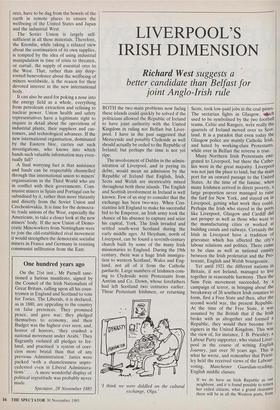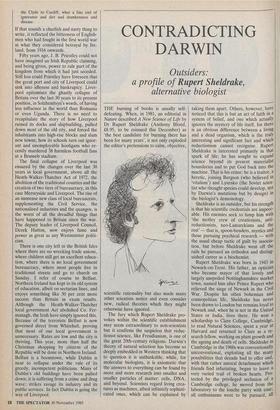LIVERPOOL'S IRISH DIMENSION
Richard West suggests a
better candidate than Belfast for joint Anglo-Irish rule
BOTH the two main problems now facing these islands could quickly be solved if the politicians allowed the Republic of Ireland to have joint authority with the United Kingdom in ruling not Belfast but Liver- pool. I have in the past suggested that Merseyside and possibly Clydeside as well should actually be ceded to the Republic of Ireland; but perhaps the time is not yet ripe.
The involvement of Dublin in the admin- istration of Liverpool, and in paying its debts, would mean an admission by the Republic of Ireland that English, Irish, Scots and Welsh are inextricably mixed throughout both these islands. The English and Scottish involvement in Ireland is well known. Few of us stop to consider that the exchange has been two-way. When Con- stantine left England to make his successful bid to be Emperor, an Irish army took the chance of his absence to capture and seize his capital, York. The Irish invaded and settled south-west Scotland during the early middle ages. At Heysham, north of Liverpool, can be found a seventh-century church built by some of the many Irish missionaries to England. During the 19th century, there was a huge Irish immigra- tion to western Scotland, Wales and Eng- land, not all of it from the Catholic gaeltacht. Large numbers of Irishmen com- ing to Clydeside were Protestants from Antrim and Co. Down, whose forefathers had left Scotland two centuries earlier. These Protestant Irishmen, or returning 'I think we were diddled on the cultural exchange, Olga.' Scots, took low-paid jobs in the coal Tines. The sectarian fights in Glasgow, wijich used to be symbolised by the two football teams, Celtic and Rangers, were really the quarrels of Ireland moved over to Scot- land. It is a paradox that even today the Glasgow police are mainly Catholic Irish, and hated by working-class Protestants, while over in Belfast the reverse is true.
Many Northern Irish Protestants emi- grated to Liverpool, but there the Catho- lics were in the great majority. Liverpool was not just the place to land, but the main port for an onward passage to the United States. At the time of the famine, when many Irishmen arrived in direst poverty, a large proportion never managed to raise the fare for New York, and stayed on in Liverpool, getting what work they could. Perhaps the Irish who stayed in the ports like Liverpool, Glasgow and Cardiff did not prosper as well as those who went to the manufacturing cities or worked at building canals and railways. Certainly the Irish in Liverpool have a tradition of grievance which has affected the city's labour relations and politics. There came to be class as well as national enmity between the Irish proletariat and the Pro- testant, English and Welsh bourgeoisie.
Yet until 1921 the different nations in Britain, if not Ireland, managed to live together in reasonable harmony. Then the Sinn Fein movement succeeded, by a campaign of terror, in bringing about the breakaway of 26 southern Irish counties to form, first a Free State and then, after the second world war, the present Republic. At the time of the Free State, it was assumed by the British that if the Irish broke with us altogether and formed a Republic, they would then become for- eigners in the United Kingdom. This was the view of, for instance, J. B. Priestley, a Labour Party supporter, who visited Liver- pool in the course of writing English Journey, just over 50 years ago. This Is what he wrote, and remember that Priest- ley held the received views of the Labour- voting, Manchester Guardian-reading, English middle classes:
If we do have an Irish Republic as our neighbour, and it is found possible to return her exiled citizens, what a grand clearance there will be in all the Western ports, from the Clyde to Cardiff, what a fine exit of ignorance and dirt and drunkenness and disease.
If that sounds a churlish and nasty thing to write, it reflected the bitterness of English- men who had fought in the first world war at what they considered betrayal by Ire- land, from 1916 onwards.
Fifty years ago, J. B. Priestley could not have imagined an Irish Republic claiming, and being given, power to rule part of the kingdom from which it had just seceded. Still less could Priestley have foreseen that the great port and city of Liverpool could sink into idleness and bankruptcy. Liver- pool epitomises the ghastly collapse of Britain over the last 30 years to its present position, in Solzhenitsyn's words, of having less influence in the world than Romania or even Uganda. There is no need to recapitulate the story of how Liverpool ruined its docks and shipbuilding, pulled down most of the old city, and forced the inhabitants into high-rise blocks and slum new towns; how its schools turn out ignor- ant and unemployable hooligans who re- cently murdered 38 harmless football fans at a Brussels stadium.
The final collapse of Liverpool was ensured by the changes over the last 30 years in local government, above all the Heath-Walker-Thatcher Act of 1972, the abolition of the traditional counties and the creation of two tiers of bureaucracy, in this case Merseyside and Liverpool. The rise of an immense new class of local bureaucrats, supplementing the Civil Service, the nationalised industries and the quangos, is the worst of all the dreadful things that have happened to Britain since the war. The deputy leader of Liverpool Council, Derek Hatton, now enjoys fame and power as great as any Westminster politi- cian.
There is one city left in the British Isles where there are no wrecking trade unions, where children still get an excellent educa- tion, where there is no local government bureaucracy, where most people live in traditional streets and go to church on Sunday. I refer of course to Belfast. Northern Ireland has kept to its old system of education, albeit on sectarian lines, and enjoys something like 30 per cent more success than Britain in exam results. Although the Heath-Walker-Thatcher local government Act abolished Co. Fer- managh, the Irish have simply ignored this. Because of the terrorists Belfast is now governed direct from Whitehall, proving that most of our local government is unnecessary. Rates are low and the city is thriving. This year, more than half the Christmas shopping by citizens of the Republic will be done in Northern Ireland.
Belfast is a boomtown, while Dublin is near to collapse under the rule of its greedy, incompetent politicians. Many of Dublin's old buildings have been pulled down; it is suffering from a crime and drug wave; strikes ravage its industry and its public services. In fact Dublin is going the way of Liverpool.



























































 Previous page
Previous page